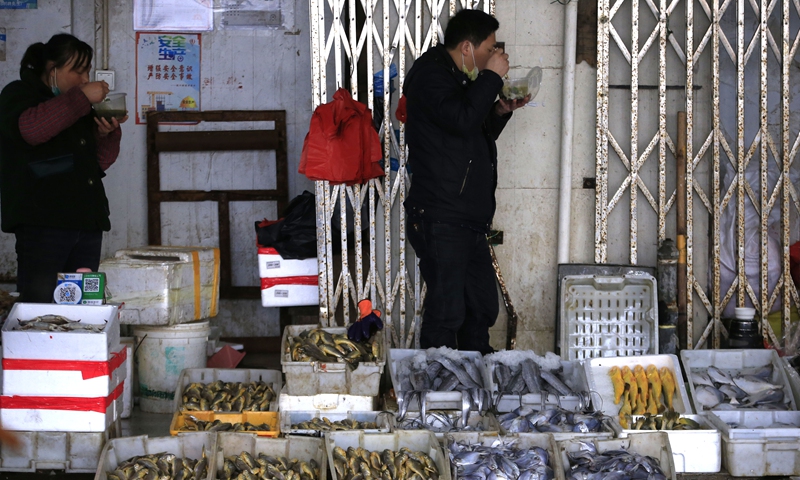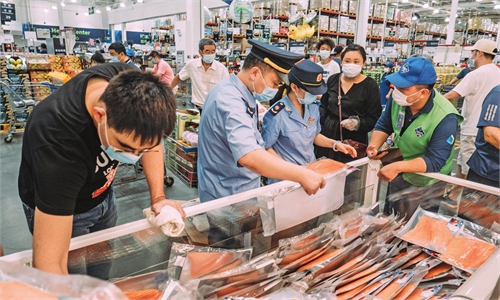SOURCE / INDUSTRIES
Ensuring agricultural imports from BRI countries necessary despite virus fears

Two seafood vendors eat their lunch before another wave of customers arrive at a wet market in Shanghai on Saturday. Photo: Yang Hui/GT
After months with almost no new COVID-19 infections in Beijing, there are renewed concerns of a resurgence of domestic transmissions. Dozens of new cases have been reported in recent days. According to local health officials, all cases can be traced back to the Xinfadi market, Beijing's largest wholesale food market, where a chopping board used to cut imported salmon tested positive for coronavirus.
As early data suggest this coronavirus strain appears to have European origins, the findings have sparked discussion on how the virus entered the market. According to Wu Zunyou, chief epidemiologist at the Chinese Center for Disease Control and Prevention, it is essentially impossible for a fish to become infected with the coronavirus, but fish can be contaminated by workers during capture or transportation. It is also possible the chopping board may have been contaminated by infected individuals or other infected products.
Still, some say imported agricultural products, particularly imported aquatic products, should not become a loophole in China's efforts to prevent imported COVID-19 cases. They are calling on relevant authorities to tighten inspection and quarantine measures for such imported and refrigerated products to curb the risk of future virus spread. As a result, local authorities in some provinces have announced they will step up safety inspections for imported aquatic products and other agricultural goods.
China's imports of agricultural products are expected to see some consequent impact in the near future, and it remains essential for authorities to keep such impact under control, especially when it comes to agricultural imports from countries along the Belt and Road route. China's agricultural trade cooperation with countries along the Belt and Road route has been gaining momentum in recent years. In 2019, China imported 237.22 billion yuan ($33.42 billion) of agricultural products from 57 Belt and Road countries, according to the Chinese Ministry of Agriculture and Rural Affairs.
It should be noted that even during a period of enhanced inspection and quarantine measures, China has the ability and will try its best to minimize the impact on agricultural imports from Belt and Road countries.
For starters, the cold chain logistics system is well developed in China, so the impact of enhanced quarantine measures on the quality of agricultural imports could be limited. Moreover, China has sufficient capacity and manpower to tighten import inspection and quarantine measures, meaning the process could be completed in a short period to minimize impact. Finally, a green channel could be considered for agricultural imports from Belt and Road countries so as to ensure the sustainable development of agricultural trade with these nations.


